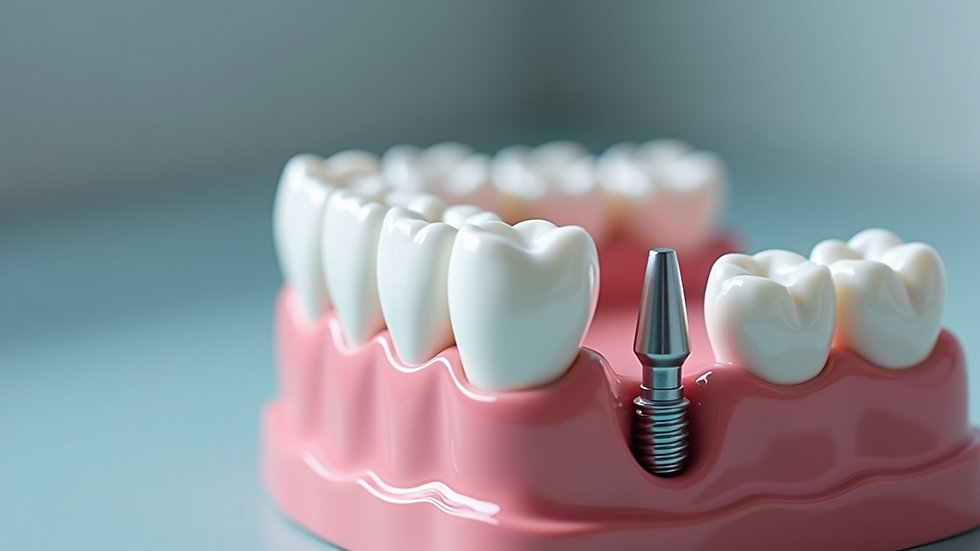Why Dental Implants Are a Long-Lasting Solution
- Evershine Dental Clinic
- Jul 15, 2025
- 4 min read
Missing teeth can pose significant challenges. From affecting your ability to chew food properly to impacting your confidence while smiling, the effects of tooth loss can be profound. One of the most effective solutions to this problem is dental implants, which offer a long-lasting and stable option for restoring your smile. In this post, we will explore why dental implants are a highly recommended solution for tooth loss.
Understanding Dental Implants
Dental implants are artificial tooth roots, typically made from titanium, that are placed into your jawbone to support replacement teeth. These implants fuse with the bone in a process called osseointegration, creating a strong foundation for crowns, bridges, or dentures. Because they become a permanent part of your jaw, dental implants provide a durable and reliable solution for missing teeth.

Furthermore, dental implants are custom-made to blend seamlessly with your existing teeth. This ability ensures that the shapes, sizes, and colors match perfectly, offering a natural look and feel. Many patients find that they can hardly distinguish between their dental implants and their natural teeth.
Why Choose Dental Implants
There are many reasons why dental implants might be the ideal choice for someone dealing with tooth loss. Here are a few essential advantages:
Durability: Dental implants are designed to last a lifetime with proper care. Unlike bridges or dentures, which may need to be replaced every 5 to 10 years, dental implants can sustain functionality for decades.
Bone Preservation: When you lose a tooth, the jawbone beneath it can start to deteriorate. Dental implants help to stimulate the bone, preventing bone loss and maintaining facial structure.
Enhanced Comfort: Unlike removable dentures, which can slip and cause discomfort, dental implants are securely embedded in the jaw. They feel like natural teeth and do not cause irritation or discomfort in the surrounding areas.
Improved Functionality: Dental implants allow you to eat your favorite foods without worrying about them slipping or sliding. They restore full chewing capability, making meals enjoyable again.
Aesthetic Appeal: With dental implants, patients can achieve a beautiful and natural-looking smile. The implants mimic the appearance and function of natural teeth, boosting confidence.
If you are looking for more details on the various benefits of dental implants, visit this link for comprehensive information.

Are Dental Implants Good or Not?
Many people wonder whether dental implants are a worthwhile investment. The answer typically leans toward a resounding yes. Numerous studies and surveys support the effectiveness and advantages of dental implants. For instance, studies show that patients with dental implants often experience enhanced quality of life, improved self-esteem, and significant satisfaction levels with their dental treatment.
One major point of distinction is that dental implants do not affect surrounding teeth. In contrast, dental bridges require adjacent healthy teeth to be filed down for support. This means that choosing dental implants helps to preserve your natural teeth and maintain their health.
However, it’s important to note that not everyone is an ideal candidate for dental implants. Factors such as overall health, age, and the condition of your jawbone play critical roles. Consulting with a professional before making decisions can help determine if dental implants are right for you.

What to Expect During the Dental Implant Procedure
Undergoing a dental implant procedure typically involves several key steps. A consultation with your dentist will start the journey, where they will assess your overall health and create a treatment plan. Here is a general overview of what to expect:
Initial Consultation: Your dentist will examine your mouth, take X-rays, and discuss your medical history to ensure that dental implants are appropriate for you.
Implant Placement: The dental implant is surgically placed into the jawbone. This is done under local anesthesia, so you should feel minimal discomfort.
Healing Period: After the implant is placed, a healing period of a few months is necessary for the osseointegration process to occur, allowing the implant to bond with your bone.
Abutment Placement: Once healed, an abutment is attached to the implant. It serves as a connector for the crown.
Crown Placement: Finally, a custom-made crown is attached to the abutment, completing the restoration.
Care and Maintenance of Dental Implants
Taking care of your dental implants is crucial for their longevity. Here are some practical tips for maintaining your implants:
Daily Oral Hygiene: Brush and floss your dental implants just like your natural teeth. This will help in preventing plaque buildup and gum disease.
Regular Dental Check-ups: Schedule regular dental visits for professional cleanings and check-ups. Your dentist can monitor the health of your implants.
Avoid Hard Foods: While dental implants are durable, you should avoid chewing hard foods that can put too much stress on them.
Quit Smoking: Smoking can impair healing and increase the risk of implant failure. Quitting can improve your outcomes significantly.
Watch Out for Signs of Trouble: Pay attention to any changes in your oral health, such as pain or swelling around the implants, and consult your dentist immediately if any arise.
By following these steps, you can ensure that your dental implants will serve you well for many years.
Final Thoughts
Dental implants are more than just a cosmetic solution for tooth loss; they are a long-term investment in your overall health and quality of life. Offering durable, natural-looking, and functional options, they can positively impact your self-esteem and daily living.
If you're considering dental implants as a solution for missing teeth, consult with a dental professional to learn more about your options. With the right care, dental implants can provide a lifetime of benefits, making them a worthwhile choice for those dealing with tooth loss.




Comments